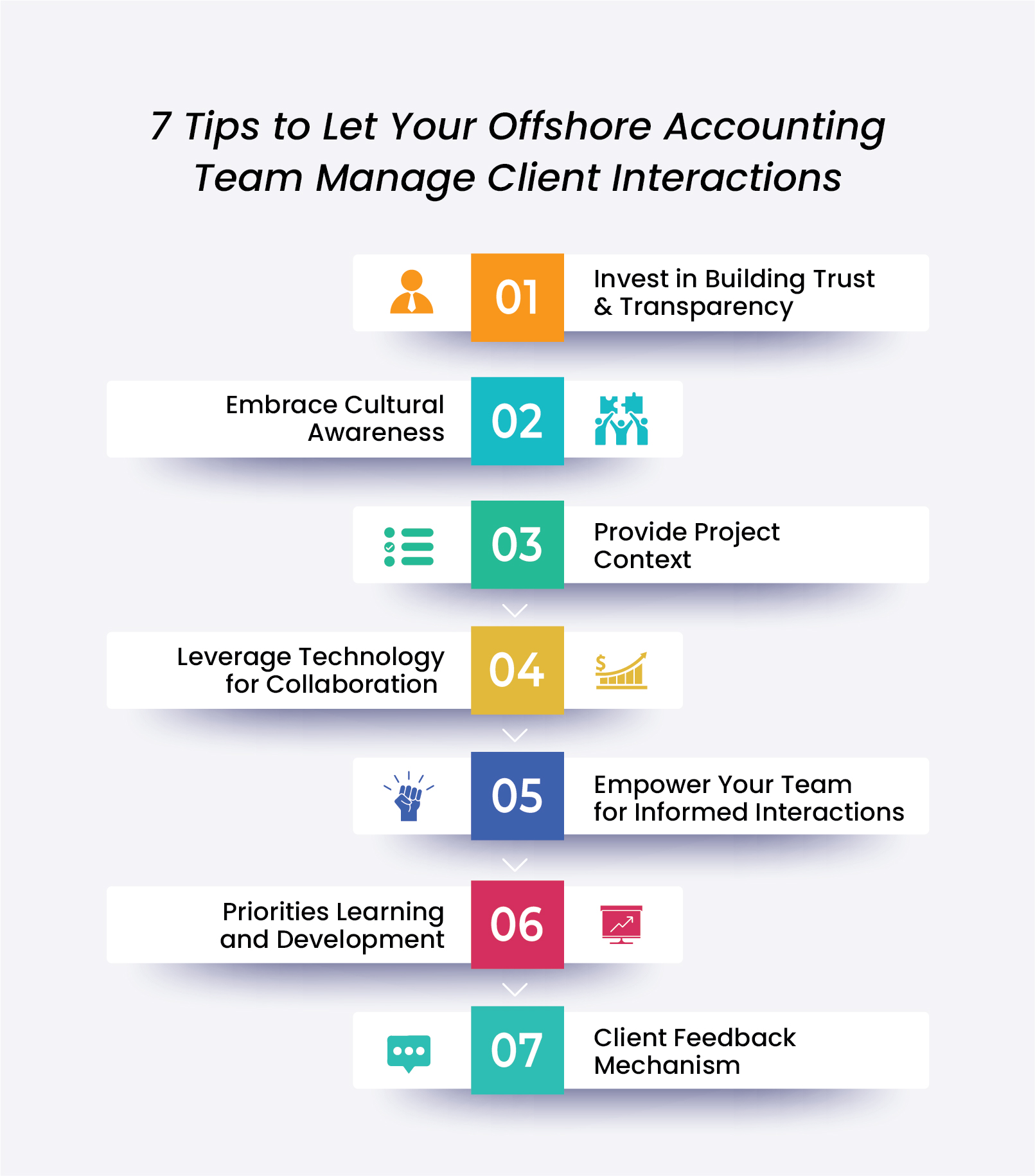
Why Tiered Pricing Strategy is a must for Accounting Firms (+Template Inside)
Tiered pricing gives accounting firms a flexible, confident way to price their services and raise fees without fear. Template included.

There is a common myth about Offshore Team for Accounting only being good for routine tasks like bookkeeping, payroll, and year-end compliance. It’s time to debunk it. If you’re willing to involve them in client communications, that is a possibility.
In this blog, we’ll cover 7 tips that can help you in preparing your offshore accounting team for effective client interactions and make the best of outsourced accounting.
When we talk to accounting firms ready for offshore accounting services and looking for a reliable offshore accounting partner, we often hear the question, “What tasks can the offshore accounting team handle?” The answer is simple: anything that doesn’t require physical presence. At Credfino, we have assembled a team of US GAAP-trained accountants and Chartered Accountants (equivalent to CPAs).
How much you want to delegate responsibilities to your Offshore Team for Accounting is up to you. If you’re willing to involve them in client communications, that’s possible too. We prefer to have a senior accountant to get involved in client communications for a hassle-free accounting outsourcing experience.
It is essential that your Offshore Team for Accounting gets ongoing training from your offshore accounting provider itself. That’s what we do as offshore staffing partners for US accountants and accounting firms.
But there are also steps you can take to prepare your offshore accounting team to effectively represent your firm to clients.

First, be upfront and proactive about your decision to offshore accounting with your client. You don’t want them to be surprised in a meeting when someone from another part of the world is handling their financial information. Don’t wait for them to discover you have an Offshore Team for Accounting tasks. Often companies are reluctant towards offshoring and outsourcing. Explain them the difference between offshore accounting and outsourced accounting
Explain the benefits—like access to specialized skills and quicker turnaround times—to set a positive tone. Be clear about the team’s composition and roles. This transparency can prevent skepticism and foster acceptance.
Introduce offshore accounting team members to clients through emails that include professional backgrounds or set up introductory video calls. These interactions help in humanizing the distant team members, making them more relatable and integrated into the service framework the client experiences.
Tips to enhance team introduction –
This one is applicable for both – onshore and offshore – establish clear communication protocols.
You can strengthen communication by training your offshore team in professional communication practices and cultural sensitivity.
By implementing these steps, you’ll foster trust and transparency between your clients and the offshore team, leading to a more productive and collaborative working relationship.
Having dedicated Points of Contact (POCs) is essential on two fronts: one for your client and one for your offshore accounting team.
With designated POCs on both sides, clients always know exactly who to contact for inquiries or updates. For starters, you can team-up onshore and offshore teammates.
Similarly, your offshore team has a single point of contact within your company, so they don’t have to navigate through different departments or individuals. This streamlined approach reduces confusion and ensures messages reach the right person with the necessary expertise.
People from different countries have unique ways of greeting, speaking, and even joking. Cultural awareness training can help avoid friction when offshoring accounting.
Here’s how accounting firms can embrace cultural awareness for their offshore teams:
Providing project context is crucial for success of your Offshore Team for Accounting. It helps them understand the client’s industry, goals, and background, allowing them to analyze data more effectively, spot potential issues, and ask insightful questions. This leads to clearer communication, tailored recommendations, and stronger client relationships. Ultimately, project context enhances efficiency and positions your offshore team as valuable partners in your client’s financial well-being.
Scenario: Imagine your offshore accounting team in India is assigned a new client, a real estate investment firm based in New York City.
Without Project Context: The team gets a spreadsheet with rental income and expense data for several properties. They process the data and prepare basic financial reports but might miss important details due to lack of context.
With Project Context: The accounting firm provides a detailed project brief that includes:
This information helps the offshore team understand the client’s specific concerns. They can now analyze the data with a focus on identifying cost-saving opportunities (e.g., comparing utility bills across different properties) and prepare reports that directly address the client’s needs.
When working remotely, you need tools that make collaboration as seamless as being onsite. Technology is key to bridging the gap between Offshore Team for Accounting and clients. Use tools like video conferencing, instant messaging, and cloud-based document management systems. These tools enable real-time collaboration, easy sharing of updates and documents, and help create a more integrated team environment.
Since the pandemic, the market has been flooded with accounting software. Many tools claim to be one-stop solutions for all your collaboration needs. Choosing the right tech stack saves time and money, enhances digital accounting, and improves internal workflows.
Give your Offshore Team for Accounting comprehensive details about clients’ businesses, including past transactions, preferences, and challenges. In remote work, overcommunication is key. Never assume the other person knows—provide information clearly and thoroughly.
This knowledge helps the team anticipate needs and tailor their approach, enhancing the client’s experience and satisfaction. Basically, having past information empowers your offshore team to become a problem-solver, not just a number cruncher.
This proactive approach builds trust with the client and shows the Offshore Team for Accounting understand their business. In the world of offshore accounting, clear communication is essential, and this extra knowledge ensures everyone is on the same page, leading to a happier client and a successful working relationship.
The accounting field is always changing, with new laws, regulations, and best practices popping up regularly. Keeping your offshore team trained on these updates, as well as industry-specific developments, is crucial.
And let’s not forget about AI’s emerging impact in accounting. AI won’t replace accountants anytime soon, but it can certainly make their work more efficient. For example, creating a chart of accounts for a non-complex business might take an experienced accountant 15 minutes. With AI, they can have a first draft ready in just a minute.
Under Learning and Development (L&D), firms should focus on training related to both legal updates and tech advancements. Continuous learning keeps your team competent and up-to-date, boosting client confidence in their abilities.
When you partner with an Offshore Team for Accounting and include them in client communication, clear communication becomes even more critical. To get the best results and ensure your clients feel valued, establish a client feedback mechanism. Here are two key steps to set it up:
For Example: “The financial statements were easy to understand, but including brief explanations for key variances would be beneficial,” or “The team was responsive to my questions, but proactive updates on project progress would be helpful.”
Remember: Feedback is a two-way street. Establish a system for your offshore team to voice their challenges, like unclear project instructions or communication gaps with clients. Addressing these concerns fosters a positive work environment and a more productive team, leading to a win-win situation for both your clients and your Offshore Team for Accounting.
Credfino is offshore accounting partner of over 100 CPAs and accounting firms, providing a skilled team of US GAAP-certified accountants for US and Canada accounting firms.
Answering the question – “Can Offshore Team for Accounting handle client communications?”, Yes!
Just as we’ve successfully done for our 100+ clients.
Want to expand your team without the hassle? Contact us today to see how Credfino can help you scale your accounting firm with offshore accounting teams
Clients might be concerned about communication, quality of work, time zones, and losing a personal touch. Address these concerns with transparency, highlighting clear communication strategies (dedicated points of contact, project management tools).
Offshoring Accounting can impact relationships positively (timely delivery and work done on priority) and negatively (communication challenges). Prioritize clear communication (multiple channels, cultural awareness training), manage expectations, and build trust through responsiveness and ongoing feedback. Your onshore team acts as a bridge, maintaining control and ensuring service quality.
Clear communication is key. The accounting firm should play a crucial role in bridging the gap. You can provide the offshore team with comprehensive information about your business, including past financial statements, industry specifics, and your unique challenges. Regular meetings and clear project documentation can also foster a deeper understanding of your needs.

Tiered pricing gives accounting firms a flexible, confident way to price their services and raise fees without fear. Template included.

Offshore accounting is here to stay. The question is how it is affecting the accounting industry. This is a debate that matters.

No accountant wants to train AI and ML models. Yet, AI in accounting can’t be ignored. Learn how to use accounting AI without being technical.